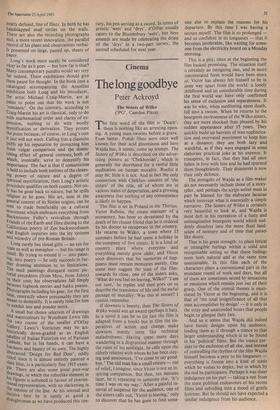Cinema
The long goodbye
Peter Ackroyd
The Sisters of Wilko (PG', Camden Plaza)
The first word of the film is 'Death': there is nothing like an arresting open- ing. A young man swoons before a grave. Even better. Polish films were once well known for their acid gloominess and here Wajda has, it seems, come up trumps. The Sisters of Wilko is described on the adver- tising posters as `Chekhovian', which is generally the shorthand for a rueful little meditation on human morality. Rueful it may be; little it is not. And in fact the only connection with Chekhov consists of 'the sisters' of the title, all of whom are in various states of desperation, and a growing awareness that nothing of any consequence is likely to happen.
The film is set in Poland in the Thirties. Victor Rubens, the estate manager of a monastery, has been so devastated by the death of his closest friend that he is ordered by his doctor to recuperate in the country. He returns to Wilko, a town where 15 summers before he had spent a holiday in the company of five sisters. It is a kind of country place where everyone and everything merely grow older, and Victor soon discovers that his memories of hap- piness must remain memories merely. One scene may suggest the tone of the film: towards its close, one of the sisters asks, 'What do you feel on leaving, Wilko?' I am not sure,' he replies and then goes on to describe the transience of life and the awful passage of morality. Was this at sunset? I cannot remember.
If slowness is beauty, then The Sisters of Wilko would win an award (perhaps it has). In a novel it can be so (in fact the film is adapted from a book) but in film the im- peratives of action and change make slowneSs merely seem like technical maladroitness. Having spent many days wandering in a disgruntled manner through the ruins of his nostalgia, he calls upon the elderly relative with whom he has been stay- ing and announces, 'I've come to say good- bye.' The old man has a small seizure — out of relief, I imagine, since Victor is not an in- spiring companion. But then, ten minutes later, he is repeating to someone else, 'It's time I was on my way.' After a painful in- terval of suspense for the audience, one of the sisters calls out, 'Victor is leaving,' only to discover that he has gone to find some-
one else to explain the reasons for his departure. By this time I was having a seizure myself. The film is so prolonged and so confident in its longueurs — that it becomes intolerable, like waiting for some- one from the electricity board on a Monday morning.
This is a pity, since at the beginning the film looked promising. The situation itself is certainly an intriguing one, and in more concentrated form would have been more io. Victor has always felt himself to be in ,ome way apart from the world: a lonely childhood and an unendurable time during the first world war' have only confirmed his sense of exclusion and separateness. It was he who, when meditating upon death, fell into a swoon. When he returns to the bourgeois environment of the Wilko sisters, they are more shocked than pleased by his sudden appearance after 15 years. They quickly build up barriers of wan sophistica- tion and enervated merriment to keep him at a distance; they are both lazy and watchful, as if they were engaged in some elaborate practical joke at his expense. It transpires, in fact, that they had all once fallen in love with him and he had spurned them thoughtlessly. Their disinterest is now their only defence.
The strengths of Wajda as a film maker do not necessarily include those of a story- teller, and perhaps the script-writer must in part be blamed for the elaborate lacunae which interrupt what is essentially a simple narrative. The Sisters of Wilko is certainly very beautiful to look at, and Wajda is most deft in his recreation of a fusty and unimaginative bourgeois world which sud- denly dissolves into the more fluid land- scape of memory and of time that passes like desire.
That is his great strength: to place lyrical or intangible feelings within a solid and recognisable setting so that those feelings seem both natural and at the same time unattainable. In this film each of the characters plays a conventional part in the mundane round of work and days, but all of them are sometimes seized by sensations or emotions which remain just out of their grasp. One of the central themes is enun- ciated by Victor at the beginning, and it is that of 'the total insignificance of all that man accomplishes by design' — it is only in the stray and unattended hours that people begin to glimpse their fate.
And so it seems that Wajda did indeed have heroic designs upon his audience, leading them as if through a trance to that larger understanding which is to be found in his 'political' films. But the trance per- sists to the exclusion of all else, and instead of controlling the rhythm of the film Wajda himself becomes a prey to his longueurs everything is frozen into a kind of stasis which he wishes to depict, but in which by the end he participates. Perhaps it was sheer indulgence on his part — taking a rest from the stern political endeavours of his recent films and subsiding into a mood of gentle lyricism. But he should not have expected a similar indulgence from his audience.










































 Previous page
Previous page